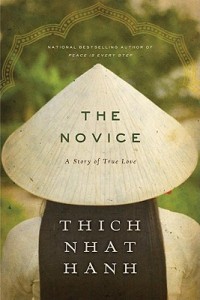In moments of real or perceived injustice, how do we react? Do we feel overwhelmed with rage, grief or betrayal? Do we become attached to an idea of ourselves as victims and become resentful or self-righteous? Or can we get unstuck from these feelings, find true compassion for our self and others, and remain rooted in our practice even in the face of the worst crimes?

Many of us, in this situation, would become angry or resentful towards those who treat us unfairly. But Kinh Tam, who has been studying Buddhist texts, reflects on the situation and sees that everyone is suffering because they do not have right understanding. She finally decides to become a monk, disguising herself as a man and becoming ordained as a novice at a Buddhist monastery.
However, not long after Kinh Tam joins the monastery, new false accusations are directed her way. The entire monastery is affected. The choices she makes next demonstrate profound spiritual maturity, humility, compassion and courage. When asked how she endures the false accusations and gossip perpetuated about her, she tells her fellow disciples,
“When we practice looking deeply, then we have a chance to understand better and be more accepting. Our hearts naturally open up, becoming vast like the oceans and rivers. In understanding the sorrows and difficulties of others, we are able to accept and feel compassion for them, even if they have caused us difficulties, treated us unfairly, brought disaster upon us, or unjustly harassed us. Due to desire, vengeance, ignorance, and jealousy, people have made numerous mistakes and caused much suffering to themselves and others. If we can comprehend this, then we will no longer condemn or resent others. As we become more inclusive, our hearts and minds will be at peace. […] When our heart is filled with loving-kindness, compassion, joy, and equanimity, its capacity becomes boundless, immeasurable. With such an expansive heart, immense as the wide-open sea, those blatant injustices and suffering cannot overpower us, just as a small handful of salt cannot make a great river salty.”
After the story of Kinh Tam, Thich Nhat Hanh and his disciple Sister Chan Khong relate experiences from their own lives: how they and their fellow monks faced criticism, cruelty and even murder as they did their best to be of service, and how they found the courage to go on without carrying anger, hatred or vengeance in their hearts. Sister Chan Khong comments,
As I grew up and matured through decades of brutal wars in Vietnam, I saw the collapse of moral values and the increase in corruption, violence and depravity everywhere day by day. But anytime I complained to Thay, my teacher, about how ugly people could be, Thay always gently defused my righteous indigation. He told me it’s because of people’s wrong perceptions about things – seeing a “poisonous snake” in the path that really is just a piece of rope – that they react with fear and violence against each other in these horrible ways.
Thich Nhat Hanh’s writing is simple and kind as he relates the profound and challenging concepts of compassion and equanimity in the face of whatever comes. He makes the return to equanimity feel possible for anyone, starting with the very simple step of breathing mindfully. If you are feeling stuck in hurt feelings or the sense that a situation is deeply unfair, this book is a beautiful, inspiring, yet gentle guide past these thorny feelings into expansive, peaceful compassion.
Pranada Devi is a communications professional living in Toronto, Canada. She manages the Politics, Books and Activism sections for Parvati Magazine in addition to serving as Managing Editor for the magazine overall. Her personal library has featured Thich Nhat Hanh’s books for over a decade. She serves as an advisor on marketing communications for Parvati’s various projects.












